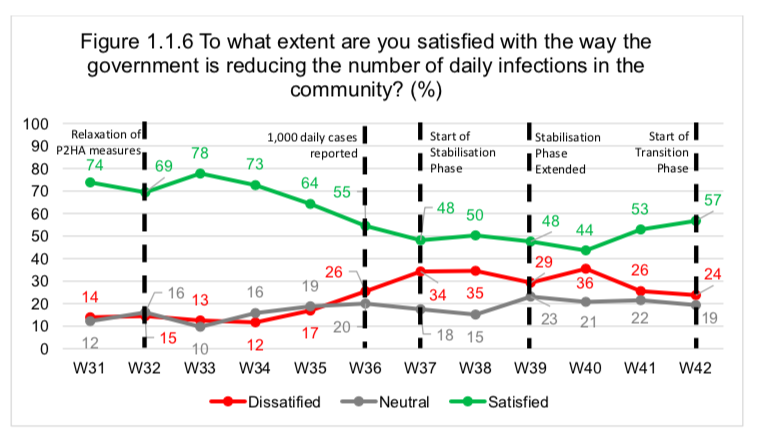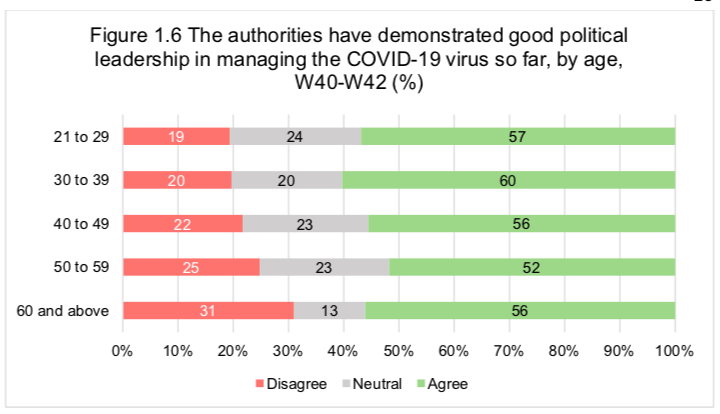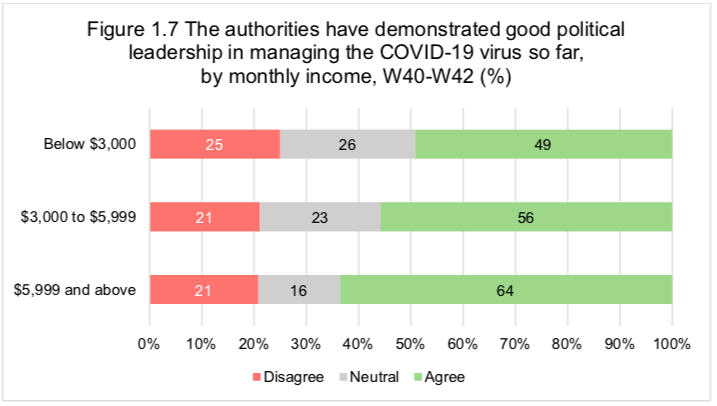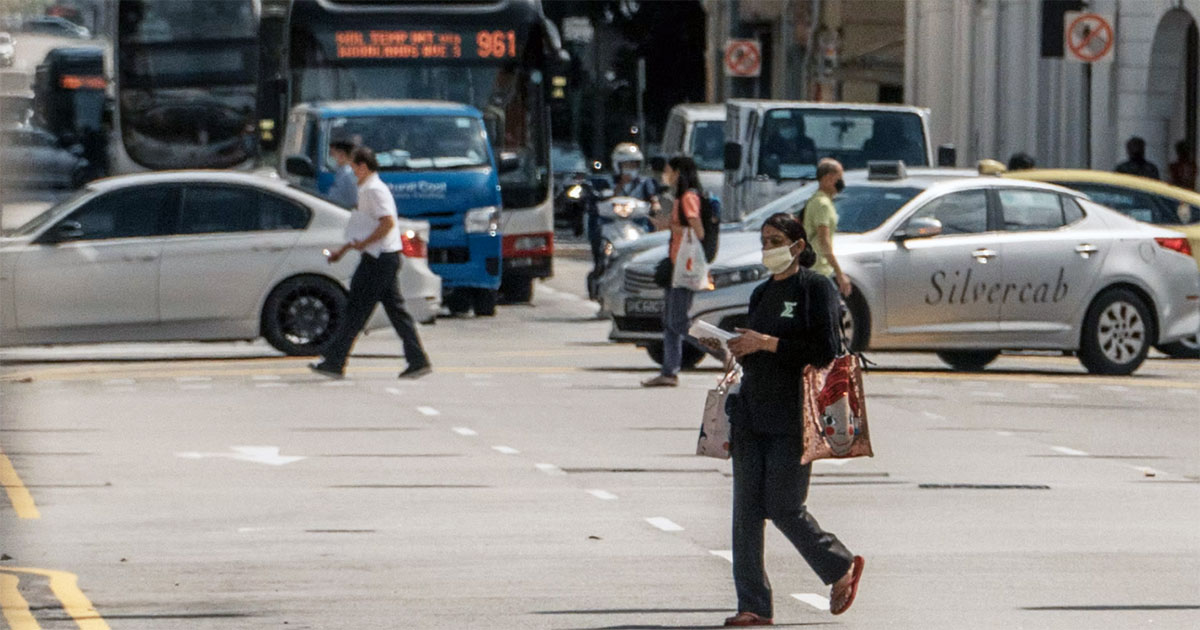Follow us on Telegram for the latest updates: https://t.me/mothershipsg
Singaporeans' satisfaction with the overall governance of Covid-19 dropped to its lowest of 59 per cent between Oct. 1 and 11, 2021, a period of time when the country saw a massive spike in cases with a warning that they could go up as high as 5,000 per day.
The decline of satisfaction levels was sharp as previously it was at a high of 82 per cent barely two months before over the Aug. 7 to 19 National Day period.
This finding, along with others, were presented in a working paper by the Institute of Policy Studies (IPS) that aimed to survey Singaporeans' attitudes on living with Covid-19 as an endemic disease in Singapore.
This study is a continuation of a working paper that began in April 2020 surveying Singaporeans' attitudes from the period covering the second Phase 2 (Heightened Alert) to the present day.
About 500 respondents were surveyed over a time period described as a "wave" that each lasted anywhere from a seven to 12-day period, and the sample size was representative of the national population's gender and race.
Survey on Singaporeans' satisfaction
The study covered other aspects, such as Singaporeans' satisfaction with the state of the healthcare sector, as well as people's belief in the political leadership during the pandemic.
Out of all these data, another notable sentiment surveyed that showed plummeting levels of satisfaction pertained to the way the Singapore government was reducing the number of daily Covid-19 infections.
In this aspect, satisfaction levels fell even more sharply to 44 per cent between late October 2021 and early November, in tandem with the spike of daily cases reported during that period that had remained high for close to two months and peaking at 4,248 new cases on Oct. 29.
This was after Covid-19 cases steadily crept upwards from 156 cases on Aug. 31 to 177 cases on Sep. 1 to breaching the 1,000-case psychological barrier by clocking 1,005 cases by Sep. 18.
Context of plunging satisfaction with overall handling of Covid-19 by government
Respondents' satisfaction with the government's overall handling of Covid-19 reached a peak of 82 per cent in mid-August, but declined gradually to its lowest of 59 per cent in early October.
This was the lowest ever proportion recorded since the study started in April 2020.
However, satisfaction levels have since recovered to about 64 per cent between Nov. 19 to 23, 2021.
The authors, Mathew Mathews, Syafiq Suhaini, Mike Hou, and Fiona Phoa, suggested that the respondents' assessment of the government was to some extent influenced by the number of daily cases and the relaxation of measures.
Context of plunging satisfaction with government's handling of daily infections
Satisfaction with the government's handling of daily infections dropped from a high of 78 per cent in August to 44 per cent in late October, representing a 34 per cent drop.
Likewise, the authors similarly observed that "satisfaction levels appeared to move in tandem with case numbers".
The authors wrote that as "cases rise, proportion of those who were satisfied decreased; while as case numbers stabilised, so too did satisfaction levels".
 via IPS.
via IPS.
Belief in political leadership in managing Covid-19
Between mid-July to September 2021, seven in 10 respondents believed that the government displayed good political leadership in managing the virus.
However, this declined to 53 per cent during the extended stabilisation phase in late October.
As adjustments were made to the stabilisation phase and as Singapore entered the transition phase, the proportion increased to nearly 60 per cent.
Older people and richer people have different perspectives
The study also found that during this period, the older population was more likely to believe that the authorities have not demonstrated good political leadership in managing Covid-19.
 via IPS.
via IPS.
The authors suggested that the dissatisfaction that the elderly felt towards the government could be due to the loneliness they have been experiencing during the pandemic, and the "constant reminder" to get vaccinated and to avoid social gatherings.
The break in perception with the elderly was most pronounced among the higher income earners, who were more likely to believe that the authorities have demonstrated good political leadership.
 via IPS.
via IPS.
Satisfaction high for keeping healthcare system running
While satisfaction levels fell slightly for most of the policies as the number of community cases shot up in later waves, satisfaction levels have stabilised and remained relatively high.
This is especially the case for satisfaction in keeping the healthcare system running where around 80 per cent of respondents indicated satisfaction.
Around seven in 10 were satisfied with the way the government has supported livelihoods and welfare needs during the pandemic, ensured that safe management measures were adhered to, and communicated to the public on policies and plans related to the pandemic and re-opening.
Sentiments towards how government listening to Singaporeans' concerns yo-yo-ing
Sentiments towards how the government was listening to the concerns of Singaporeans was yo-yo-ing.
The proportion of those who felt positive, i.e. happy, reassured or pleasantly surprised, went from:
58 per cent: July 14 to 25
62 per cent: July 26 to Aug. 7
61 to 64 per cent: Aug. 7 to Sep. 10
56 per cent: Sep. 15 to 21
46 per cent: Oct. 1 to 11
48 per cent: Oct. 15 to 27
56 per cent: Nov. 19 to 23
Other findings
- Almost 70 per cent felt that vaccinations should be compulsory for all Singaporeans and long-term residents, and 90 per cent thought it was important to take annual booster shots
- Slightly more than half feel positive about having vaccinated-differentiated measures
- At least 59 per cent of respondents during Nov. 19 to 23 felt that safe management measures (SMMs) should continue for another one to six more months
- Some 80 per cent favoured a slower reopening with fewer deaths, as opposed to opening quickly but with a higher death count
Follow and listen to our podcast here
Top photo via Kingsley Yang/Unsplash
If you like what you read, follow us on Facebook, Instagram, Twitter and Telegram to get the latest updates.
